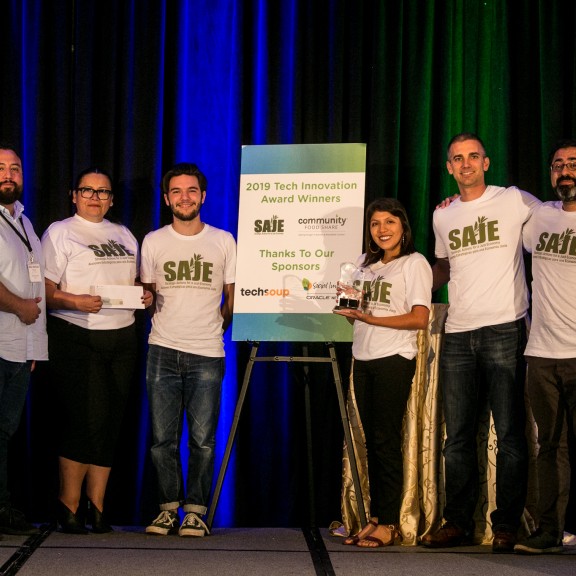Technology Innovation Awards
Does your nonprofit have a technology related project idea that will advance your mission? The Technology Innovation Awards recognize nonprofit organizations that have plans to positively impact their communities and change lives, through innovative technology projects.
Could your organization benefit from a $10,000 technology grant?
Tech Forward will grant $10,000 to nonprofits to help implement these technologies. From building apps for your community, producing interactive data sets for your funders, or creating programs using predictive analytics, the TIA grant is a catalyst to starting projects that can help you reach your mission.
The 2024 Application Window Opens in June, 2024
FAQ
Eligible nonprofits must:
- Be a 501(c)3 or 501(c)4 charitable organization (as defined by the Internal Revenue Services), other than: churches and organizations whose primary mission is to promote a religion; private schools, colleges, or universities; nonprofit hospitals or cooperative hospital service organizations; and governmental units.
- Demonstrate fiscal responsibility, which is defined by adherence to general accounting standards.
- Be inclusive and embrace diversity; does not discriminate in service delivery and employment on any basis including ethnicity, gender, sexual orientation or religion.
- Have an annual operating budget of at least $500,000.
- Send a representative to the conference to accept the award (travel stipend available).
Part One: Eligibility (must meet all requirements above)
Part Two: Organizational Information
- Organization Name
- EIN #
- Website URL
- Primary Contact Information
- Annual Budget
Part Three: Organizational Background
- Mission
- Offered Services
- Key Constituents
- Additional, Relevant Background (if applicable)
Part Four: Technology Project
- Project Name | Project Teaser Description
- Full Project Description
- Target Timeline & Dates
- Draft Project Budget (Attach)
- Part Five: Project Impact
- Target Impact
- Lifespan of Impact / Measurable Metrics
*These questions are subject to change
Application is open to all US based organizations, or international organizations with US presence. International organization that are registered through a US-based nonprofit or parent organization are also eligible.
Winners will be notified in August and announced at the Tech Forward Conference in September. Winners are expected to send at least one representative to the conference to accept award.
Yes, winners should agree to send at least one representative to the Tech Forward Conference in September. Travel stipend will be provided.
Winners are asked to provide six month updates to Tech Impact for assistance and promotional purposes only.
Questions? Contact techforward@techimpact.org with the subject line “TIA Question“
